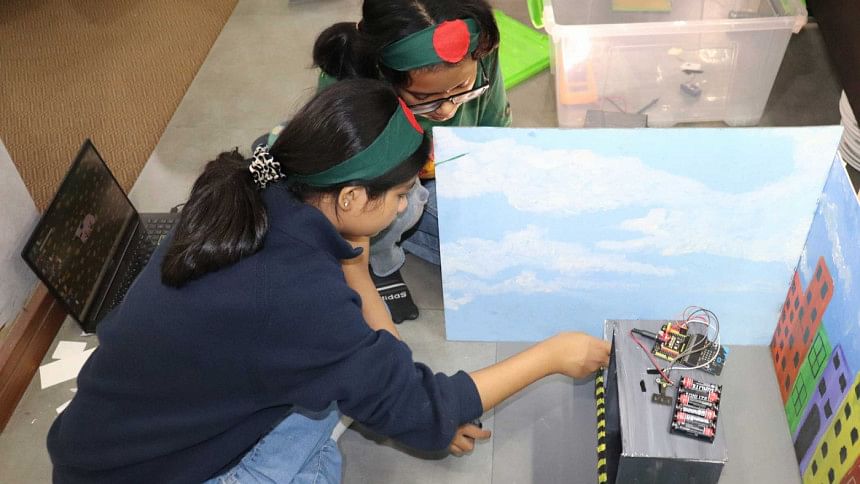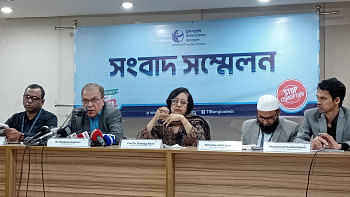Time to adapt to AI

Did you know that Bangladeshi girls and boys won four gold medals at the International Robot Olympiad (IRO) last month? Since 1999, girls and boys from around the world have been competing here every year with their amazing ideas and the robots they build. In 2021, Team Bangladesh won four gold, two silver, five bronze, and four technical medals at the IRO. This is an achievement that should encourage many more youngsters to enter the amazing world of robotics. As a nation, we should be proud and assured that amid myriad problems, we are producing intelligent youngsters—our first robot builders. I humbly acknowledge the tremendous work done by the organisers and promoters behind this success. But how do we make this success permanent? We have the human capital, our leadership has embraced the vision too, but are the institutions ready to lead?
AI (artificial intelligence) is a buzzword that engenders both fear and hope. This is because AI can automate many tasks resulting in cheaper, faster, and better performance than humans. So, economies that are embracing AI-based automation have greater leverage than others. This means that a novel digital divide among the "haves" and the "have nots" is lurking in the corner. Many international institutions like PricewaterhouseCoopers (PWC) and Mckinsey have forecasts on how many tasks of almost all economic sectors will be replaced by AI-backed automation. There will be new jobs and roles added to the economies, while many traditional jobs will become obsolete.
However, AI is in its nascent state. Even the developed nations have only started harnessing AI. Also, unlike previous technologies, AI is less about infrastructure and more about knowledge and education. Hence, any nation with a planned educational scheme can reap its full benefits. However, the first step is to have a practical and context-aware strategy.
The Bangladesh government's ICT Division portal hosts a draft AI strategy. According to that draft, a task force was supposed to be established by 2019, prototype development and piloting was due to be done by 2021, and data-driven directive generation and a fully trained workforce are supposed to be in place by 2024. However, a prolonged web search failed to provide any information regarding the progress of this strategy. Meanwhile, Oxford Insights' Government AI Readiness Index 2020 tells us that Bangladesh ranks 123rd among 172 countries, and in the regional ranking, we are 14th among 16. One of the parameters of this index is "vision," where Bangladesh scores zero.
There are a couple of other indices that are also relevant to understanding our technology readiness. One of them is a Portulans Institute's Network Readiness Index, based on parameters like technology competitiveness, governance, individuals' readiness, and social and economic conditions. According to the 2021 index, Bangladesh ranks 95th among 130 countries, despite having a score higher than expected given its income level. In the individuals' readiness sub-index, Bangladesh ranks 104 with points lower than the lower-middle-income average. The United Nations' e-government development index (EGDI) indicates the state of digital inclusion, in 2020 EGDI, Bangladesh ranked 119th out of 193. Among its South Asian peers, Bangladesh is lagging behind India (100), Bhutan (103), and Sri Lanka (85). To sum up, these indices point out that the culture of digital inclusion in the country is not satisfactory.
To bring about a cultural shift, vision is necessary, but not sufficient. First, we need to focus on making the government truly digital. Bangladesh has some piecemeal solutions, but with no electronic ID or holistic data management system, and without a user-friendly interface, these interventions are fractured. The country can move forward only if the transactions between the government and the residents become secured and easy.
Second, we should focus on finding a way to leapfrog. As a soon-to-be developing country, Bangladesh is slowly moving towards heavy manufacturing, but the economy is still dependent on agriculture, textile, and garments. With AI, most manual tasks in these sectors will be automated. This means that we will need fewer-in-number-but-better-in-skills labour. With proper planning, new technologies infiltrate faster in societies where people do not enjoy the luxury of traditional technologies. The developing world saw faster growth of mobile phones and mobile financial services than the developed world, where there are robust landlines and banking services. This is proof that leapfrogging is possible. The key is to start with one sector and not to worry about all others. Maybe we could emphasise agriculture or textile and put all our research and planning efforts on building AI-driven appropriate technologies and engaging people.
Third, we need to plan on infrastructure. Emphasis should be given to wider use of mobile telephony and applications. This requires ensuring robust high-speed connectivity, and sufficient wireless bandwidth. Secured applications should be designed that are usable with little tech knowledge and no language barrier. These applications will need a vast amount of data while collecting much more. These data should be made available for greater use, and the regulatory regime should ensure that personal privacy will not be at stake in the name of public safety.
Finally, we need to plan on ensuring education for all. The critical need of a successful AI-based society is its educated residents. The focus should be on ensuring multi-disciplinary training starting from the primary level. In the AI world, emphasis should be given to STEAM (science, technology, engineering, arts and mathematics), not STEM (science, technology, engineering, and mathematics), as we need more society-aware scientists, technologists, and science-aware social workers, and creative residents. We should also emphasise making our educational institutions ready for "continuous education," focusing on training and awareness for all.
Bangladesh came a long way in 50 years. However, the next phase of our growth depends on a knowledge-based society. If we want to ensure development, we will have to embrace AI. Our youngsters are ready; we need to ensure that the adults have put a proper plan in place.
Dr Moinul Zaber is senior academic fellow at the Operating Unit on Policy-Driven Electronic Governance (UNU-EGOV) in United Nations University (UNU), Guimaraes, Portugal. His Twitter handle is @zabermi. The views expressed in this article are those of the author.

 For all latest news, follow The Daily Star's Google News channel.
For all latest news, follow The Daily Star's Google News channel. 



Comments